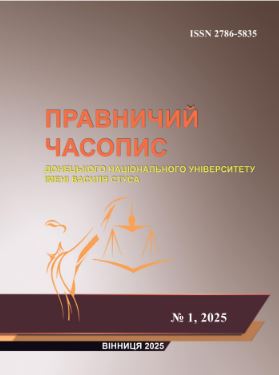Economic procedural legal personality of Trade Unions in the context of the implementation of the Sustainable Development Strategy by the global community
DOI:
https://doi.org/10.31558/2786-5835.2025.1.10Keywords:
economic procedural legal personality, trade union, protection of rights, parties to economic procedural relations, economic process, legal capacity, capacity to act, tort capacity, sustainable developmentAbstract
The study highlights the content and structural elements of the concept of ‘economic procedural legal personality’ of trade unions as an important component of the procedural and legal status of these entities at the doctrinal and legislative levels. The author identifies some problematic issues related to the subject matter of the study and develops proposals for improving the legal regulation of these issues in the context of implementation of the sustainable development strategy by the international community.
The article determines that modern trade unions are one of the active promoters of sustainable development goals on a global scale, since the purpose of their establishment is to represent and protect labour, socio-economic rights and interests of employees, and it is they who carry out the mission related to fair distribution of income, primarily between employers and employees, without regard to protecting the right to decent work of the latter.
The author proves that trade unions are inherent in economic procedural legal personality, which is the key to their effective statutory activities, since it is an indispensable component of their procedural and legal status and is necessary to protect property and other rights and interests of these entities as parties to economic proceedings in the event of relevant conflicts.
The article summarizes that trade unions as parties to economic proceedings are characterized by the following: they become parties to an economic case and conduct proceedings in it on their own behalf (as a plaintiff or a defendant); may participate in the case through representatives; are endowed with the appropriate procedural and legal status from the moment the proceedings are initiated; act in defence of their own rights and legitimate interests; each party is interested in resolving the dispute in its own favour; their legal personality allows for procedural succession; and a court decision is made in their case.
The author argues that it is necessary to rename Article 44 of the CEP of Ukraine from ‘Procedural legal capacity and procedural capacity’ to ‘Economic procedural legal personality’ and to supplement this Article with a new provision on procedural tort capacity, which is closely related to capacity and consists in the ability to bear responsibility for committed offences. This will make it possible to provide a full description of the triad of elements of trade unions’ economic procedural legal personality as a complex legal property of these entities.
References
Перетворення нашого світу: Порядок денний у сфері сталого розвитку до 2030 року: Резолюція, прийнята Генеральною Асамблеєю 25.09.2015. URL: https://www.undp.org/uk/ukraine/publications/peretvorennya-nashoho-svitu-poryadok-dennyy-u-sferi-staloho-rozvytku-do-2030-roku
Профспілки – провідники цілей сталого розвитку у глобальному світі. Прес-центр ФПУ. Офіційний вебпортал Федерації професійних спілок України. 19.03.2025. URL: https://fpsu.org.ua/239-mkp-perr/15489-profspilki-providniki-tsilej-stalogo-rozvitku-u-globalnomu-sviti-2.html
Кушнір Р. С. Щодо правового статусу професійних спілок України. Матеріали VІІ Міжнародного молодіжного наукового юридичного форуму (м. Київ, 16–17 травня 2024 р.). Київ: Національний авіаційний університет, 2024. C. 477–481.
Кушнір Р. С. Проблеми захисту у господарському судочинстві майнових прав професійних спілок у дискурсі їх статутної діяльності. Академічні візії. 2024. № 32. URL: https://academy-vision.org/index.php/av/article/view/1247
Беляневич В. Е. Господарський процесуальний кодекс України: наук.-практ. комент. Вид. третє. Київ: Видавництво «Юстініан». 2009. 872 с.
Опришко В. Ф. Чергове «одержавлення профспілкового майна». Щотижнева загальнонаціональна правова газета: on-line версія. 2020. № 5. URL: https://yvu.com.ua/chergove-oderzhavlennya-profspilkovogo-majna-2/
Осовий Г., Кондик П. Щодо правового статусу майна професійних спілок України. Вісник АПСВТ. 2018. № 4. С. 96–104.
Куртакова Г. О. Правовий статус профспілок у формування системи соціального партнерства в Україні. Наукові праці Міжрегіональної Академії управління персоналом. Юридичні науки. 2022. № 62. С. 34–43. DOI: 10.32689/2522-4603.2022.2.6.
Полховська Н. М. Правовий статус професійних спілок працівників правоохоронних органів: дис. … д-ра філос. за спец. 081 – Право. Київ: Національна академія внутрішніх справ, 2024. 249 с.
Спасибо-Фатєєва І. В. Проблеми права власності профспілок. Університетські наукові записки. 2007. № 2. С. 147–155.
Хатнюк Н. С., Побіянська Н. Б. Правові засади визначення правосуб’єктності сторін у господарському процесі. Європейські перспективи. 2021. № 4. С. 142–150.
Науково-практичний коментар до ГПК України від 26.09.2014. Ligazakon. URL: https://ips.ligazakon.net/document/KK002494
Рішення Північного апеляційного господарського суду від 28.01.2020 у справі № 910/9126/19. ЄДРСР. URL: https://reyestr.court.gov.ua/Review/87424929
Рішення Господарського суду Одеської області від 22.04.2024 у справі № 916/571/24. URL: https://reyestr.court.gov.ua/Review/118703560

